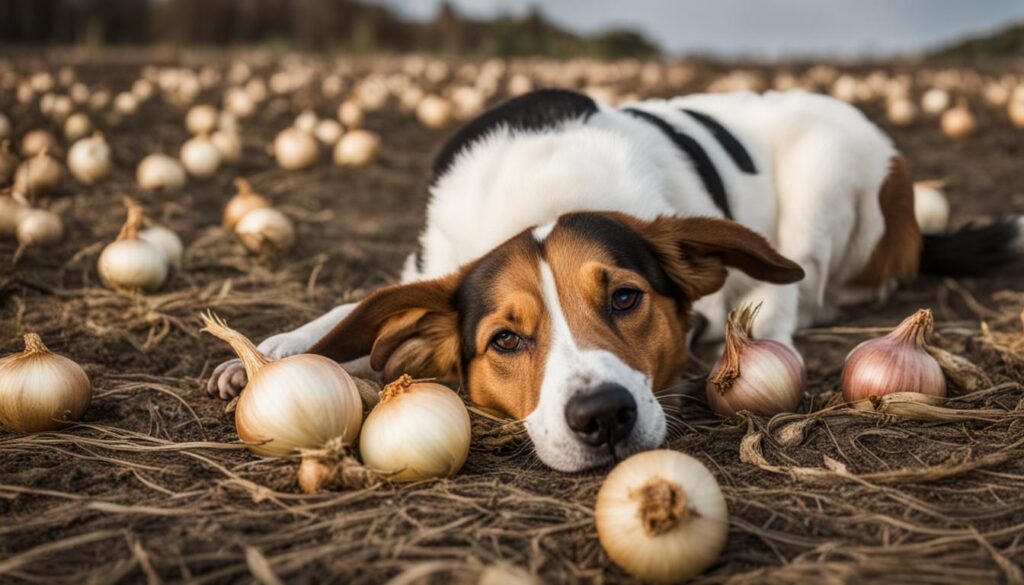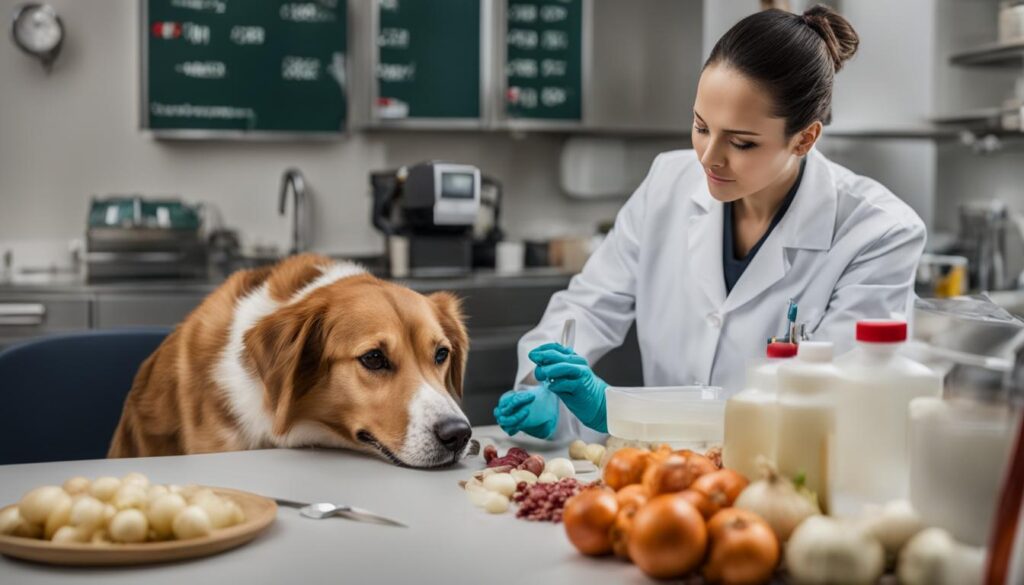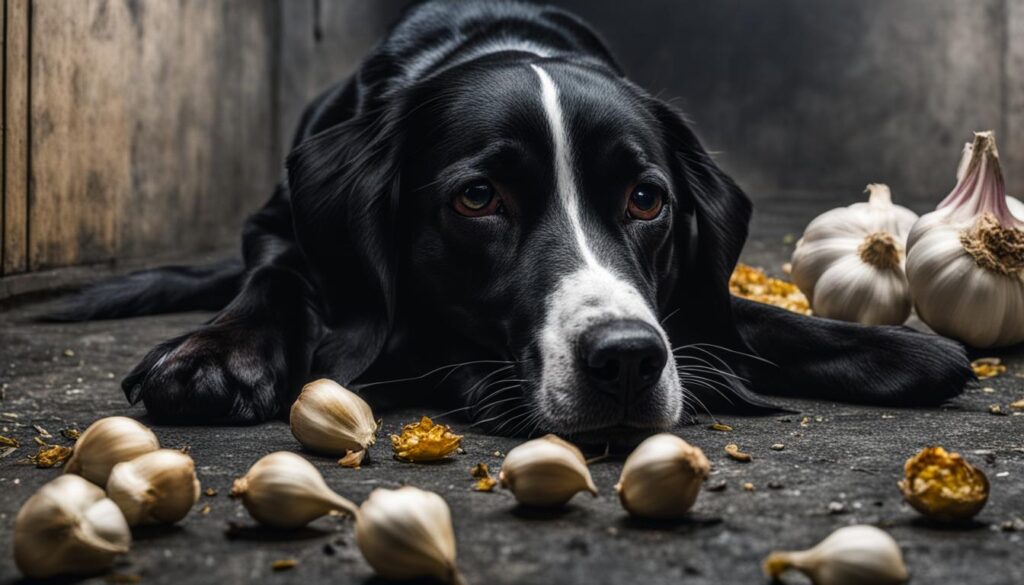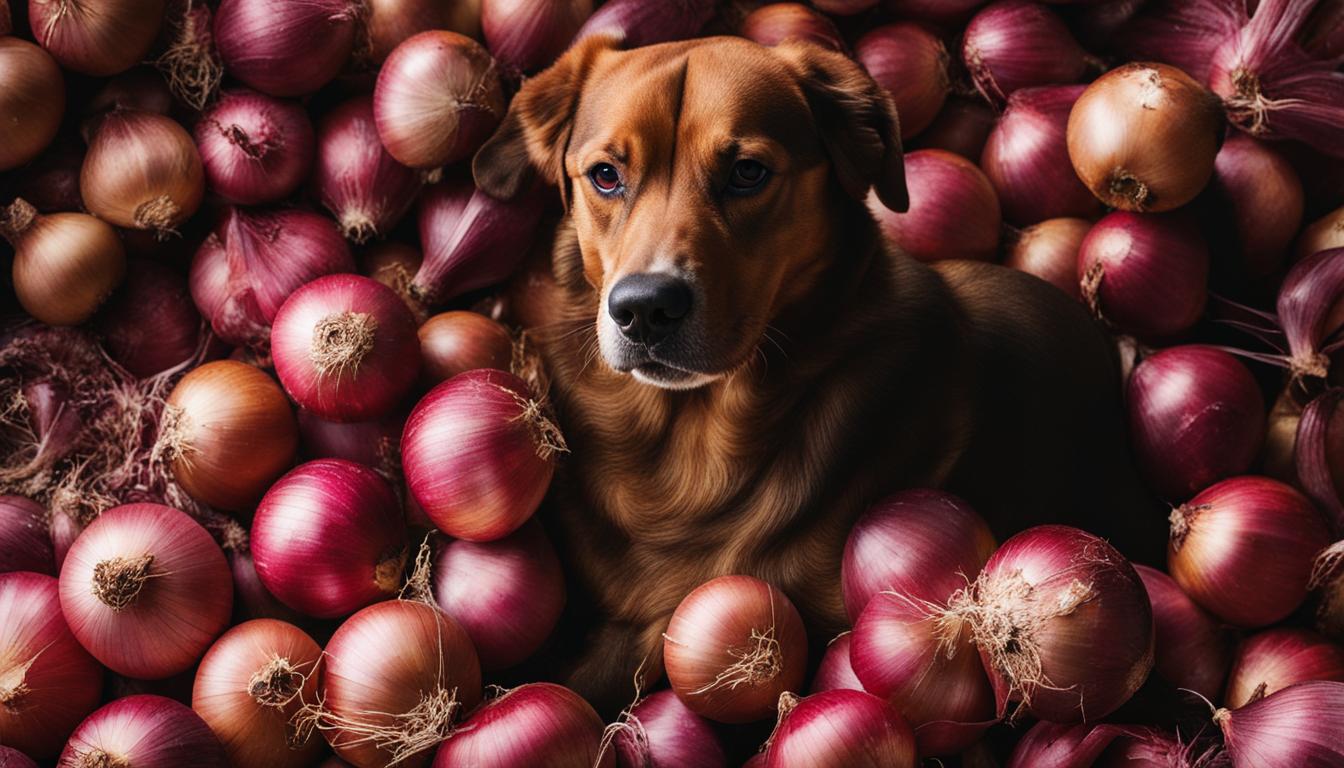Welcome to our informative article on whether dogs can eat onions. While onions may be a staple in many of our favorite dishes, they can pose a serious risk to our furry friends. Onion toxicity in dogs is a real concern, and it’s important for every dog owner to understand the potential dangers. In this section, we will explore the risks associated with onions and the toxic compounds that make them harmful to dogs.
Onions contain a compound called N-propyl disulfide, which can cause a breakdown of red blood cells in dogs. This can lead to a condition known as anemia. It’s important to note that all parts of the onion plant, including the flesh, leaves, juice, and processed powders, are harmful to dogs. Even small amounts of onion can be toxic, and the symptoms of onion toxicity in dogs can range from vomiting to elevated heart rate and anemia.
If you suspect that your dog has consumed onions, it’s crucial to seek veterinary attention immediately. Prompt treatment is necessary to address the effects of onion toxicity and prevent further complications. Remember, prevention is always the best approach when it comes to keeping our beloved pets safe and healthy.
Key Takeaways:
- Onions are toxic to dogs due to the presence of N-propyl disulfide, which causes a breakdown of red blood cells.
- All parts of the onion plant are harmful to dogs, including the flesh, leaves, juice, and processed powders.
- Even small amounts of onion can be toxic and may lead to symptoms such as anemia, vomiting, and elevated heart rate.
- If you suspect your dog has consumed onions, seek veterinary attention immediately.
- Prevention is crucial – keep onions and onion-containing products out of your dog’s reach.
How Does Onion Toxicity Affect Dogs?
Onion toxicity in dogs can have serious effects on their health, particularly in relation to their red blood cells. The toxic compound found in onions, called N-propyl disulfide, can cause a breakdown of red blood cells, leading to a condition known as hemolytic anemia. This condition occurs when the toxin in onions attaches to oxygen molecules in the red blood cells, impairing their ability to carry oxygen throughout the body.
As a result of onion toxicity, dogs may develop symptoms such as vomiting, diarrhea, elevated heart rate, panting, weakness, and icterus (yellowing of the skin and mucous membranes). These symptoms are indicative of the oxidative damage caused by onion toxicity to the red blood cells. Under a microscope, abnormal blood cells known as Heinz bodies may be visible, further confirming the impact of onion toxicity on the dog’s blood.
It is important to seek prompt veterinary care if you suspect your dog has consumed onions and is exhibiting symptoms of onion toxicity. Treatment may involve supportive care such as intravenous fluid therapy to address dehydration and prevent further kidney damage. In severe cases, a blood transfusion may be necessary to combat the anemia caused by onion toxicity. By understanding the effects of onion toxicity in dogs and taking swift action, you can help ensure the best possible outcome for your pet.

Common Symptoms of Onion Toxicity in Dogs:
- Anemia
- Vomiting
- Diarrhea
- Elevated heart rate
- Panting
- Weakness
- Icterus (yellowing of the skin and mucous membranes)
Effects of Onion Toxicity on Red Blood Cells:
The toxic compound in onions causes oxidative damage to red blood cells, impairing their ability to carry oxygen. This leads to a breakdown of the red blood cells, resulting in hemolytic anemia. The formation of abnormal blood cells, known as Heinz bodies, further contributes to the detrimental effects of onion toxicity on the red blood cells.
It is crucial to recognize the symptoms of onion toxicity in dogs and seek veterinary care promptly to address this potentially life-threatening condition. Remember to always keep onions and onion-containing products out of your dog’s reach to prevent the risk of onion poisoning.
Treating Onion Toxicity in Dogs
If your dog has consumed onions and shows symptoms of toxicity, it is crucial to seek veterinary care immediately. Treatment for onion toxicity may involve inducing vomiting to remove the onions from the dog’s system, especially if ingestion occurred within the last two hours. Intravenous fluid therapy may be administered to alleviate dehydration and prevent hemoglobin-related damage to the kidneys. In severe cases, a blood transfusion may be necessary to address the anemia caused by onion toxicity.

| Treatment Options for Onion Toxicity in Dogs | Details |
|---|---|
| Inducing Vomiting | Removes onions from the dog’s system if ingestion occurred within the last two hours. |
| Intravenous Fluid Therapy | Administered to alleviate dehydration and prevent kidney damage. |
| Blood Transfusion | Necessary in severe cases to address anemia caused by onion toxicity. |
The best way to prevent onion poisoning in dogs is to keep onions and any onion-containing products out of their reach. Be mindful of ingredients in dog food and treats, as onions may be present in certain formulations. If you suspect your dog has ingested onions or any other toxic substance, do not hesitate to contact your veterinarian for guidance. Prompt treatment is crucial to ensure the best outcome for your furry friend.
Other Vegetables Safe for Dogs
While onions are toxic to dogs, there are many other vegetables that are safe and nutritious for them to eat. Adding these vegetables to your dog’s diet can provide them with essential vitamins, minerals, and fiber. Here are some safe vegetables for dogs:
- Carrots: Carrots are rich in beta-carotene, which is beneficial for dogs’ eyesight and immune system. They are also a great low-calorie snack that can help with weight management.
- Cucumbers: Cucumbers are a hydrating and refreshing treat for dogs. They are low in calories and can be a good source of hydration, especially during hot summer days.
- Green Beans: Green beans are a good source of fiber and can be a healthy addition to your dog’s diet. They can help with digestion and contribute to a balanced diet.
These vegetables can be served to dogs in various ways. You can offer them raw as crunchy snacks or lightly cooked for a softer texture. Remember to remove any seeds or pits and cut them into appropriate sizes for your dog to avoid choking hazards.
“Adding safe vegetables to your dog’s diet not only provides them with nutritional benefits but also offers variety and enrichment to their meals.” – Dr. Smith, Veterinarian
In addition to vegetables, there are also fruits that are safe for dogs to consume in moderation. Fruits such as apples, bananas, and blueberries can be a tasty and healthy addition to your dog’s diet. However, it’s important to remove any seeds or pits and serve them in small, bite-sized pieces.
Fruits and Vegetables Safe for Dogs
| Vegetables | Serving Suggestions |
|---|---|
| Carrots | Raw, steamed, or cooked |
| Cucumbers | Sliced or diced |
| Green Beans | Steamed or blanched |
| Fruits | Serving Suggestions |
|---|---|
| Apples | Sliced and core removed |
| Bananas | Chopped |
| Blueberries | Whole or mashed |
Garlic vs. Onion Toxicity for Dogs
Garlic, like onions, belongs to the Allium family and can be toxic to dogs. In fact, garlic is clinically proven to be 3-5 times more potent than onions in terms of toxicity. Allium species toxicosis, also known as onion toxicity, can affect dogs when they consume any variety of Allium plants, including garlic, onions, shallots, and leeks. Both raw and cooked garlic can be harmful to dogs, and even small amounts can lead to anemia and gastrointestinal upset. It is best to avoid feeding your dog any foods that contain garlic or onions to prevent the risk of toxicity.
Although garlic and onions share similar toxic properties, it is important to note that the level of toxicity can vary depending on the dose ingested and the size of the dog. While a small amount of garlic may not immediately harm a large dog, it is still recommended to err on the side of caution and avoid feeding garlic to dogs altogether. Onion toxicity in dogs can lead to serious health complications, and it is crucial to prioritize their well-being by keeping them away from all Allium plants, including garlic.
Dangerous Foods for Dogs
When it comes to feeding your canine companion, it is essential to be aware of other potentially dangerous foods as well. Along with onions and garlic, there are several other foods that should be avoided to ensure your dog’s safety and well-being. Some common examples include:
- Chocolate: Contains theobromine, which can be toxic to dogs and cause symptoms such as vomiting, diarrhea, rapid breathing, and even seizures.
- Grapes and raisins: Can cause kidney failure in dogs, leading to symptoms like lethargy, loss of appetite, and increased thirst.
- Avocado: Contains persin, which can be toxic to dogs and cause symptoms such as vomiting, diarrhea, and difficulty breathing.
It is important to keep these foods out of your dog’s reach and educate yourself on other potentially harmful substances. By prioritizing your dog’s health and safety, you can ensure they live a long and happy life.
| Food | Toxicity | Symptoms |
|---|---|---|
| Onions | High | Anemia, vomiting, elevated heart rate, panting |
| Garlic | High | Anemia, gastrointestinal upset |
| Chocolate | Moderate to high | Vomiting, diarrhea, rapid breathing, seizures |
| Grapes and raisins | Moderate to high | Lethargy, loss of appetite, increased thirst |
| Avocado | Moderate | Vomiting, diarrhea, difficulty breathing |
Remember, the best way to keep your furry friend safe is by being aware of what foods they should not consume and ensuring they have a balanced and healthy diet. Your dog’s well-being is in your hands, so make wise food choices for them and cherish every moment together.

Conclusion
In conclusion, it is essential to understand the risks of onion toxicity in dogs. Onions contain a compound called N-propyl disulfide, which can lead to the breakdown of red blood cells and cause anemia in dogs. All parts of the onion plant, including the flesh, leaves, juice, and processed powders, are harmful to our furry friends. Even small amounts of onion can be toxic and result in symptoms like anemia, vomiting, elevated heart rate, and panting.
To prevent onion poisoning in dogs, it is crucial to take preventive measures. Keep onions and onion-containing products out of your dog’s reach at all times. If you suspect your dog has consumed onions and shows signs of toxicity, seek veterinary attention immediately for the best prognosis. Prompt treatment can help mitigate the damage caused by onion toxicity and prevent further complications.
Fortunately, there are many safe and healthy alternatives to onions that dogs can enjoy. Carrots, cucumbers, and green beans are great options for dog-friendly vegetables that can be offered as treats. Additionally, there are fruits, such as apples, bananas, and blueberries, which can be given to dogs in moderation. However, it is important to do your research and ensure that any fruits or vegetables are prepared and served in a safe manner for your pet.
By being mindful of the risks of onion toxicity and making informed choices about what foods are safe for dogs, you can play a vital role in keeping your furry friend happy and healthy. Remember, prevention is key when it comes to onion poisoning in dogs. So, let’s keep those onions far away from our four-legged companions!
FAQ
Can dogs eat onions?
No, onions are toxic to dogs. The compound called N-propyl disulfide in onions can cause a breakdown of red blood cells, leading to anemia.
What parts of the onion plant are harmful to dogs?
All parts of the onion plant, including the flesh, leaves, juice, and processed powders, are harmful to dogs.
How much onion can be toxic to a dog?
Even small amounts of onion can be toxic to dogs. It is best to avoid feeding your dog any foods that contain onions.
What are the symptoms of onion toxicity in dogs?
Symptoms of onion toxicity in dogs include anemia, vomiting, elevated heart rate, panting, weakness, icterus (yellowing of the skin and mucous membranes), and brown-colored urine.
What should I do if my dog has consumed onions?
If your dog has consumed onions and shows symptoms of toxicity, it is crucial to seek veterinary care immediately.
How does onion toxicity affect dogs?
Onion toxicity in dogs causes oxidative damage to red blood cells, leading to a condition known as hemolytic anemia. The toxin in onions attaches to oxygen molecules in red blood cells, reducing their ability to carry oxygen.
How is onion toxicity in dogs treated?
Treatment for onion toxicity may involve inducing vomiting to remove the onions from the dog’s system, intravenous fluid therapy to alleviate dehydration, and in severe cases, a blood transfusion to address the anemia caused by onion toxicity.
What are some safe vegetable alternatives for dogs?
Carrots, cucumbers, and green beans are examples of dog-friendly vegetables that can be offered as healthy treats.
Can dogs eat garlic?
Garlic, like onions, is a member of the Allium family and can be toxic to dogs. It is best to avoid feeding your dog any foods that contain garlic.
How can I prevent onion poisoning in dogs?
The best way to prevent onion poisoning in dogs is to keep onions and any onion-containing products out of their reach.





